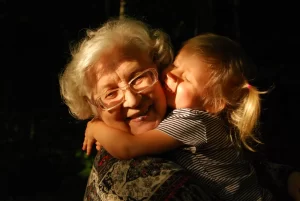
Cat’s in the Cradle: Later Life Reflections on Parenting
My child arrived just the other day
He came to the world in the usual way
But there were planes to catch, and bills to pay
He learned to walk while I was away
And he was talking ‘fore I knew it, and as he grew
He’d say “I’m gonna be like you, dad”
“You know I’m gonna be like you”
I’ve long since retired, my son’s moved away
I called him up just the other day
I said, I’d like to see you if you don’t mind
He said, I’d love to, dad, if I can find the time
You see, my new job’s a hassle, and the kids have the flu
But it’s sure nice talking to you, dad
It’s been sure nice talking to you
And as I hung up the phone, it occurred to me
He’d grown up just like me
My boy was just like me
From “Cat’s in the Cradle” by Harry Chapin

Do you ever find yourself glancing in the rearview mirror of your life and wondering—
I wish I had done things differently?
Regrets are part of life. Often deep regrets. And the older we get the more we seem to think about, and mull over things we “should have” done differently or actions we wish we had or had not taken. And if you are like most people, studies show that the most stomach-churning regrets are related to family and relationships. Running close behind are career moves, education and finances.
Harry Chapin’s legendary anthem to parental indifference and regret topped the charts in 1974. “Cat’s in the Cradle” recounts the lament of a father who repeatedly ignores quality time with his son, despite the child’s ongoing desire and declaration to grow up just like Dad. As the years pass and life unfolds, the father’s poor choices and continuous avoidance become a recurring theme. In the last verse, the tables turn. The now-retired father finally has newfound time but now the son’s own family and job prevent him from being able to get together. His son has grown up just like him. He has raised a little clone.
Reflecting on the surprising popularity of “Cat’s in the Cradle” and his own parenting mistakes, Chapin made this chilling admission: “Frankly, this song scares me half to death”.
And so it should. As we get older, we tend to have increasing “take stock” moments about our legacy as parents. We look back and wonder where we could have made better choices. A few months before my own father passed at eighty-four I asked him if he had any regrets. His response was only one:
“I wish I had spent more time with my family. I wish I had spent more time with you.”
Even though I was not yet a parent, I resolved that day to not make the same mistake given the chance. Once we did have children, I can say in retrospect that one thing my wife and I did do right was enjoy, leverage, embellish, and even sacrifice for quality time with our kids. We turned my father’s lament into a challenge. All frenzied parents of young children know that the days last forever, but the years fly by. Blink and they are gone—no do-overs, no mulligans—just the joyful relief of having seized those precious days or the haunting remorse that we just might have missed something.

Beloved spiritual writer Ronald Rolheiser issues a sober and prophetic warning for the latter:
“We will be a lot more awake to that fact (i. e. our regrets as parents) when we sit in a retirement home, stripped of youth, health, and our car keys, knowing that those years when we thought we were being taken for granted were years of privilege that were laden with a potential for joy that—because of our unawareness of privilege—we never quite picked up on” (Sacred Fire, p. 76).
In the end, the conclusion is remarkably simple. What gives our lives significance and satisfaction are intentional, sacrificial, meaningful relationships with our family, children, and friends. Ignore the obvious to your own peril. Acknowledge it to your own joy. It is your choice. And you always have a choice. Looking back, you may have missed Carpe Diem opportunities with your family and friends. Don’t miss it with your adult children and grandchildren.
“I wish I could do it all over again,” decried a lifelong friend of mine at the recent funeral of his brother who had lived a full and meaningful life. I responded softly, “In some ways you can. Start making better choices now, and a year from now you will have a year’s worth of wins!”
- Didn’t go to your child’s soccer games? Start going to your grandchildren’s games.
- Didn’t help your adolescent child do homework? Show an interest in your adult child’s profession.
- Do any of your children resent you for your past indifference and lethargy? Do something about it. Ask forgiveness.
- Regret not saying, “I love you” enough? Pick up the phone and tell them: “I just called to say, ‘I love you’” (or sing it like Stevie Wonder).
- Held on to a disagreement for years? Let it go. Admit you were wrong for a change.
- If a relationship has come undone, place a call. Push past the nerves and discomfort. Send a text. Set up a rendezvous.
If we can look at our past mistakes as learning experiences then maybe our regrets can actually help us carve out a better present. If we can stop living in the past and wallowing in the remorse that paralyzes our present and spoils our future we have a chance to turn things around. Admit our failures, own up to past mistakes and learn from them. You can’t change the past, but you can craft a better future based on the past.
This is the surprising twist that Daniel Pink spins in his brilliant book “The Power of Regret”:
“If we think about regret like this—looking backward to move forward, seizing what we can control and putting aside what we cannot, crafting our own redemption stories—it can be liberating” (p. 210).

It is never too late to start over. The best time to plant an oak tree is 100 years ago. The second best time is today. Let your past regrets vault you forward to a happier, more productive future. Stop living the past and lamenting and wishing for what could have been; rather, look forward to what can be and come up with a new plan. It is quite biblical, actually.
Consider this from the New Testament book of Hebrews 12:1-2:
… let us lay aside every weight, and the sin which so easily ensnares us, and let us run with endurance the race that is set before us, looking unto Jesus, the author and finisher of our faith …
This is an invitation to get in step with the Master; to turn away from the past and blaze forward to a new future. Christ invites us to leave the past behind—our shortcomings, sins, mistakes, and regrets—and run forward to a future of new hope, forgiveness, triumph and joy with Him. Christianity is always forward-looking based on a promise of what is to come—not a return to what might have been.
Do you ever find yourself looking in the rearview mirror of life, perhaps even getting stuck there, and wondering—I wish I had done things differently? Of course. You are human. You have regrets. But also being human, is the desire, wherewithal and ability to change and to move forward, turning regret into growth aka “the power of regret”.
It sounds so cliché—live each day as if it were your last. But what if? Would you spend those precious hours in past tunnels of despair? Or …?
It is your choice. And you always have a choice. Tomorrow comes today. Look forward, through the windshield. The view is much better.
Written by Pastor Jerry Orthner, the Senior Adults Pastor. What a great reminder that Christ invites us to leave the past behind and run forward to a future with Him! Our new teaching series “What If” starts this weekend, September 9/10. Join us as we learn about how God turns our regrets into a fresh start together!
You may also be interested in …
- Let Go, Let God, March 2023
- Being Faithful Grandparents, August 2019
- Seniors & Friends



